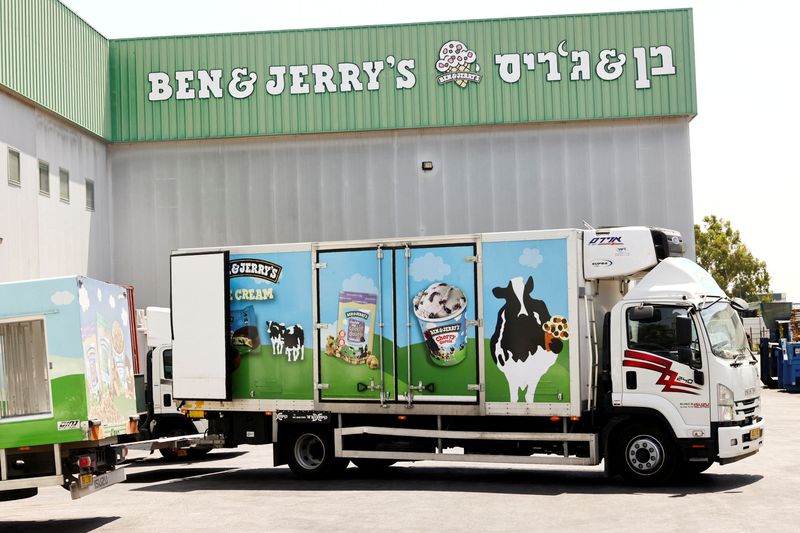By Jessica DiNapoli and Jonathan Stempel
NEW YORK (Reuters) - A U.S. judge on Monday appeared skeptical that Ben & Jerry's deserved an immediate injunction against its parent Unilever (NYSE:UL) Plc to restrict the marketing of its ice cream in the Israeli-occupied West Bank, which Ben & Jerry's said was against its values.
U.S. District Judge Andrew Carter said at a court hearing in Manhattan that he was unsure Ben & Jerry's had shown it faced "imminent harm" following Unilever's June 29 sale of the ice cream maker's Israeli business to local licensee Avi Zinger.
The unusual dispute shows the challenges Unilever faces as it encourages its brands, which number more than 400, to have social missions that the company says help drive sales.
Ben & Jerry's independent directors sued Unilever on July 5, nearly a year after the maker of Half Baked and Cherry Garcia faced a backlash by deciding to end sales in Israeli-occupied Palestinian territories because it was "inconsistent" with its values.Although the lawsuit also sought to stop the sale altogether, Monday's hearing focused on whether Ben & Jerry's deserved a temporary injunction barring Zinger from selling new or rebranded products, using its English language trademarks.
Ben & Jerry's lawyer Shahmeer Halepota said in court that Zinger could produce new products with the "exact opposite stance," causing consumer confusion.
"Instead of Peace Pops, you could make 'Tank Pops,'" Halepota said, and shoppers would see both walking down a grocery store aisle.
The judge did not immediately rule, but told a Ben & Jerry's lawyer: "I don't hear anything saying that there is anything imminent. It doesn't seem ... anything's going to happen in the next couple of weeks."
He did not say when he would rule.
When Unilever bought Ben & Jerry's in 2000, it let the brand's board retain primary responsibility to oversee the ice cream maker's social mission. Ben & Jerry's board said the sale to Zinger undermined its right to do that. The two Unilever appointees dissented.
"This is an American institution that for the last 40 years has built its credibility on this authenticity of social mission," Halepota said.
Unilever, in contrast, has said it retained the right to make operational decisions for Ben & Jerry's, and that the sale could not be undone because it has irrevocably closed.
"There is just no reason to believe ... that the continued sale of ice cream could cause irreparable harm," Unilever's lawyer David Marriott said.
Ben & Jerry's sales topped 1 billion euros (US $1.02 billion) for the first time last year.
Jeff Furman, who helped build the business and served on Ben & Jerry's board for about 40 years, said the company hadn't sued Unilever before, but once considered it after finding quality issues in the ice cream, which were later resolved.
"We have our fingers in - that's part of the job - to be vigilant and concerned about everything," he said.

Last week, Ben & Jerry's said Unilever had frozen compensation for the independent directors. [L1N2ZF1OZ]
Before Monday's hearing, two weeks of mediation to reach an out-of-court settlement broke down.